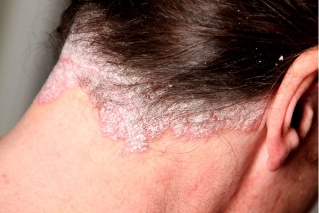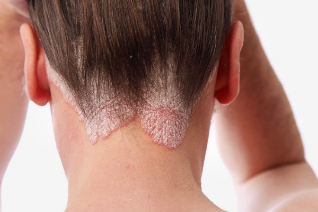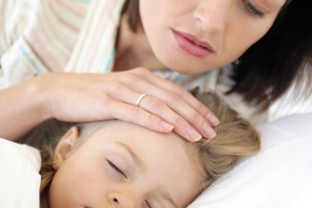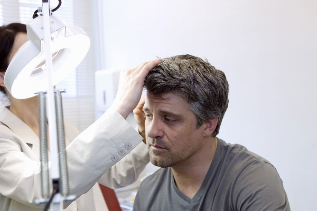Psoriasis is a non-infectious disease that occurs in 1 out of 100 people, where 80% of the cases, the defeat of the head revealed skin. It manifests itself in the Form of formation of red Plaques or patches, between which undamaged skin visible. Inflammation may extend to and with each other. Why psoriasis appears and how it is treated, find out more.
Brief information about the pathology

Psoriasis on the head is an autoimmune disease. This was the conclusion of doctors was made after the investigations of the platelets have a characteristic of an autoimmune disease changes and therapy of immune system suppressing drugs allowed General condition much easier. This disease is people from the patient to a healthy.
Psoriasis can affect anyone, but the clinical experience allows the most important risk groups. So, pathology is more common women, the genetically inherited Form is already in 15-25 years. Sick more than 50% of cases have relatives with Psoriasis one Form or another. This means that the risk, with a similar pathology was higher in those whose parents, brothers or sisters also have such a diagnosis. Psoriasis of the head, in General, suggest the following areas can of skin:
- masgefertigte;
- the upper part of the forehead;
- the area behind the ears;
- Whisky;
- the back of the neck;
- the skin on the ears, including the ears;
- Arch of the eyebrows.
Typically, these psoriasis is a wave-like character of the flow, i.e., involves alternating periods of improvement and periods of exacerbation. It is on the affected areas, the red drop-shaped tiles appear with greasy content, which is sloughed off periodically and cause itching. Similar inflammatory process leads to serious consequences for the health, but is the cause of serious psychological problems. Very often, a vicious circle arises when the Psoriasis causes Stress, and he, in turn, is the cause of the complications of the durchflieens of the disease.
The disease itself does not cause hair loss but a temporary hair loss some methods of therapy, Stress or injury to the skin can. Usually, the hair of the skin and stabilization of the Psycho-grow after cleaning-emotional state.
Why?

By the doctors, until now, not yet the exact causes of the inflammatory reactions and excessive synthesis of skin cells on the body of the patient identified. The currently leading hypothesis is that the genetic. It says that in the case of individual people there is an innate predisposition to an accelerated renewal of the keratinocytes (cells in the Epidermis of the human skin). In the Manifestation of Psoriasis, such a tilt causes a specific reaction in the immune system:
- The body begins to rapidly produce new cells the psoriatic Plaques.
- An active inflammation of the skin in the affected area (the body takes it as something alien).
- The more damaged the skin under the influence of the immunity, the more active the division of the keratinocytes is carried out.
For a long time genetic factors may remain latent, but he was awake under the influence of negative factors. These include:
- Stress. Change in the nervous system, the cause of disorders of all organs, including the skin. As a result, this leads to changes in the division of the epithelial cells.
- Frequent injuries to the skin. You cause interference in the process of division and growth of keratinocytes.
- Infectious diseases. The germs of the human immune system to attack, especially if the disease has a chronic Form. As a result of the immunity is constantly in limbo, and begins to attack epithelial cells.
- Dryness and sensitivity of skin. In this case, the skin is often suffer from micro-traumas, therefore, high probability for the development of Psoriasis.
- Climatic Conditions. In the dry and cold air, the skin experiences an increased load, so it may be to his injury, and lead to Psoriasis.
- Diseases of the endocrine system. They cause disturbances in the Melatonin produce and provoke increased secretion of growth hormone.
Another popular hypothesis is that the psoriasis develops due to metabolic disorders. In this case, the body will respond specifically to stimuli, starting with the parts of the cells in the Dermis speeds up. When in the Norm, the skin is renewed within the 3 weeks, in patients this happens within 5 days, which appear on the head numerous platelets. In this case, provoke exacerbation factors such:
- Injury of the scalp;
- emotional strain and Stress;
- infringement of a hormonal background;
- Diseases of the endocrine system;
- bad habits (Smoking, alcohol abuse);
- infectious processes in the body;
- a wrong diet;
- taking certain medications;
- Hypothermia, or prolonged exposure to cold;
- the use of low-quality care products for the scalp.
In some cases, the contact point of the development of the Psoriasis is a pathology of the immune system that may suffer as a result of severe Stress or infectious disease.
Found that the HIV-infected are diagnosed with Psoriasis in 3 times more often than healthy people.
How the pathology manifested?
The psoriasis develops gradually, and it will show in different stages in the processes can:
- On the surface of the skin, pink rash, the a rounded Form, and the top covered with numerous plates in color appear.
- Rashes gradually grow and take in diameter. At the end they turn into compacted psoriatic Plaques, which cause itching and burning. Thereafter, a strong inflammatory process begins.
- Tissue grow excessively under the pressure of the excessive multiplication of ectodermal cells in the tile in, and excessive accumulation of lymphocytes and macrophages. This leads to a thickening of the skin at the lesion and the formation of red spots in the hair growth.
- The Patient has a General feeling of illness and weakness. It can increases the body's temperature.
- The skin becomes sensitive, painful, and poet. Gradually, it loses its elasticity, becomes rough, and with Plaques, scrolls quickly.
- When combing the head, skin covered in bloody scrapes and cracks.
- Plaques gradually repelled, so that the hair can be great layers, and look similar to dandruff.
- Itching is intense, and the people fully operational.
- The man is in a depressed state, or breaks constantly, the feeling of great aesthetic discomfort.
- Pathology spreads to the whole scalp and other parts of the body.
In order to minimize the start the symptoms of Psoriasis requires consulted in the case of the first rash on the head of a dermatologist for an examination and treatment.
Characteristics symptoms in children

Psoriasis of the scalp in children develops almost the same as in adults, but more often the disease makes itself felt symptoms:
- Redness of the scalp, you can see that even by the hair of the ceiling;
- turnover of the skin moist, which in medicine is called maceration;
- Desquamation of the Plaques;
- the formation of the accumulation of Plaques on each of the sections of the scalp.
In children of the younger age group psoriasis is often reminiscent of the formation of diaper dermatitis. The disease develops very slowly and is difficult to treat.
Classification of pathology
Psoriasis of the scalp, classified by the two parameters, shape and stage of development. It depends on how the disease looks. Consider each Option separately.
Form
According to the Form of psoriasis is of two types:
- Easy. Mostly shows itself on the head in the Form of isolated lesions. In General, platelets are small and thin platelets.
- Hard. Psoriasis appear on the entire scalp. Due to the size of the tiles and become bigger and stronger, as a slight expression of the pathology.
Stage
Experts distinguish three stages of the pathology:
- The progressive. On the scalp the new rashes appear. In General, they relate to the area along the contour of the hair growth. On the psoriatic elements, the desquamation appears. Gradually islet skin rashes can join together and form a wide Zone. If the Phase occurs during the relapses, pathology, apply already existing elements for the peripherals, and what the phenomenon Kebner.
- Stationary. The inflammatory process is stored, but not new rashes. This stage is characteristic blunting of growth of the Plaques and no hyperemic to the contour of the rim dermal elements.
- Regressive. Reduces the volume of the lesions, which is an indication of the efficiency of the therapy. Gradually, the existing Plaques, the pigment spots disappear. The Patient will not disturb scaling, itching, and other symptoms of the pathology.
Diagnosis

If the rashes on the scalp, you will need a skin doctor. In addition, a consultation with a specialist for the treatment of hair (officia), and beautician, who will help you can Shampoos and other care products to choose from. In the diagnosis of the disease is an important role in the identification of a Psoriasis triad, consisting of such phenomena, as:
- Stearic Spots. Increased exfoliation, and the platelets have a silvery color, and are similar to Stearin.
- Psoriasis-Foil. If you remove the Plaque, in their place, wet the surface appears glossy.
- Blood of the Tau. When combing Plaques localized bleeding appears to be Drip.
These symptoms lead to a diagnosis through a visual inspection. In the case of this doctor based on the data of the anamnesis, including to clarify whether the relatives of the patients of Psoriasis. To confirm the diagnosis, the doctor may prescribe a biopsy (sampling of the material with the affected areas), and sowing for Flora, exceptions, fungal infection of the. In the case of generalized forms of psoriasis in addition to the blood picture. If you rush, it shows a high erythrocyte sedimentation rate (ESR) and an increased number of leukocytes.
General medicine
Psoriasis of the scalp requires an individual treatment that helps to remove the unpleasant symptoms, and most importantly, to achieve long - term Remission of any Form of pathology. For this purpose often a combination therapy is assigned. Each component deserves special attention.
It aims to combat chronic inflammatory reactions and the formation of excessive de keratocytes, since it is the lie underlying the pathological processes of the disease. In the framework of the General therapy, the doctor may prescribe the following medications:
- the means of the non-specific immune therapy (Pyrogenal, ATP);
- vitamin complex;
- Immune modulators;
- aromatic retinoids (Etretinate, Acitretin);
- Cytotoxic drugs;
- Corticosteroids;
- the solution Gemodeza intravenous drip.
The ingestion of cytotoxic drugs, and corticosteroids is advisable in the case of severe forms of Psoriasis, and significant expression of the symptoms on the scalp. If psoriasis are also enhanced by the addition of infections in the course of treatment is antibiotics.
In the context of a therapy, the doctor may also prescribe antidepressants. You need to reduce and eliminate accompanying Psoriasis, Psycho-emotional problems - Depression, Stress, anxiety increases and socialis phobia. Such preparations allow for a higher stability of the patient to Stress, reduce the frequency and severity of exacerbations of Psoriasis on the background of the nervousness, improve the quality of sleep. Some medications have anti histamine's effects, therefore, help to relieve the itching.

























